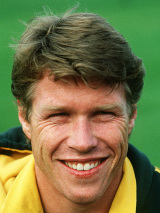
|
Full name Nicholas Campbell Farr-Jones
Born
April 18, 1962, Caringbah, NSW
Current age 62 years 8 days
Major teams Barbarians, World XV, Australia
Position Scrum-half
|
| Span | Mat | Start | Sub | Pts | Tries | Conv | Pens | Drop | Won | Lost | Draw | % | |
|---|---|---|---|---|---|---|---|---|---|---|---|---|---|
| All Tests | 1984-1993 | 63 | 62 | 1 | 37 | 9 | 0 | 0 | 0 | 42 | 20 | 1 | 67.46 |
| Bledisloe Cup | 1985-1993 | 18 | 18 | 0 | 5 | 1 | 0 | 0 | 0 | 6 | 11 | 1 | 36.11 |
| IRB Rugby World Cup | 1987-1991 | 9 | 8 | 1 | 0 | 0 | 0 | 0 | 0 | 7 | 2 | 0 | 77.77 |
| Test debut | England v Australia at Twickenham, Nov 3, 1984 match details |
| Last Test | Australia v South Africa at Sydney, Aug 21, 1993 match details |
| Test Statsguru | Main menu | Career summary | Match list | Most points | Most tries | Tournament list |
Nick Farr-Jones was the inspirational captain who led Australia to their first World Cup triumph in 1991. An intelligent, articulate presence on the field, Farr-Jones marshalled his Australian side from scrum-half.
In a team of stars, Farr-Jones was the pivot that held the side together. With Michael Lynagh, Tim Horan and David Campese to call upon, Farr-Jones' pass would invariably find a match winning talent, but it was his calm and assured leadership that allowed them to become world-beaters.
Farr-Jones always promised greatness, whether it be academic or sporting. Excelling at his studies from a young age, he graduated from Newington College to Sydney University, where he studied Law from 1980-1985. is success in the world of rugby followed swiftly, with his first taste of the big time coming with New South Wales in 1984. He was swiftly introduced into the test arena, with his first cap coming against England at Twickenham in November of that year.
Following a 19-3 win in his opening test, Farr-Jones went on to become a key part of the Australia squad that would contest the inaugural Rugby World Cup in New Zealand in 1987. Farr-Jones and Australia progressed to the semi-final at the tournament, but lost out to France following a last gasp try from mercurial full-back Serge Blanco.
In Farr-Jones' own words, the Australians played like "bums" that day and the World Cup was marked as unfinished business for both he and the Wallaby side. He was appointed as Australia captain in 1988, and he took up the reins with the measured, collected approach that was expected.
As good a scrum-half as Farr-Jones was, it was his presence on the pitch as a motivator of the side that set him apart from other captains. Whilst he was studious and assured he was also unafraid of reaching for the riot act should the situation require it.
In 1991 Farr-Jones took his Wallaby squad to the World Cup in England. The side was packed with talent, and featured another man who would lead the Wallabies to World Cup glory in the young John Eales. Australia had been the favourites in 1987, and came into this tournament amongst a pack of sides with genuine ambitions of raising the Web Ellis Cup.
Farr-Jones' side strolled from their group unbeaten, but came up against a resolute Ireland team in the quarter final. Farr-Jones limped off with an injury at Lansdowne Road and watched from the stands as Irish number 8 Gordon Hamilton touched down with only four minutes to go.
Without their leader to organise and muster a final charge, all seemed to be lost for the Wallabies. It was left to fly-half Michael Lynagh to step up, and he did just that. Kicking long and chancing his arm at regaining the ball, Lynagh scored the try that sent Farr-Jones' men into the semi final.
Once there they defeated the holders New Zealand in an all time classic, with David Campese and Tim Horan providing moments of magic that are still savoured today.
Hosts England stood in the way of Farr-Jones and glory in the final, and the Wallabies were not to be denied. Prop Tony Daly crossed for the Wallabies and they were able to snuff out the challenge of a newly adventurous England side headed up by Rob Andrew.
Farr-Jones' moment of glory at Twickenham was followed by another year of success at the helm, with a Bledisloe Cup victory and a series win over South Africa during 1992.
He retired from rugby in 1993, returning to Sydney to work as a solicitor and forge a successful career as a public speaker. His record at international level is exemplary, with 63 caps, 36 as captain, and a then record partnership of 47 Tests alongside Michael Lynagh to his name.
He will forever be remembered as the man who brought "Bill" to Australia for the first time, and also as one of the all time great captains of the international game.
Huw Baines October 2008
© Getty Images
© Getty Images
© Getty Images
Live Sports
Communication error please reload the page.
-
Football
-
Cricket
-
Rugby
-
- Days
- Hrs
- Mins
- Secs
F1 - Abu Dhabi GP
Abu Dhabi Grand Prix December 11-131. Max Verstappen ()
2. Valtteri Bottas (Mercedes)
3. Lewis Hamilton (Mercedes)
4. Alexander Albon ()
5. Lando Norris ()
6. Carlos Sainz Jr ()
-
ESPNOtherLive >>
Golf - Houston Open
Snooker - China Open
Tennis - Miami Open
